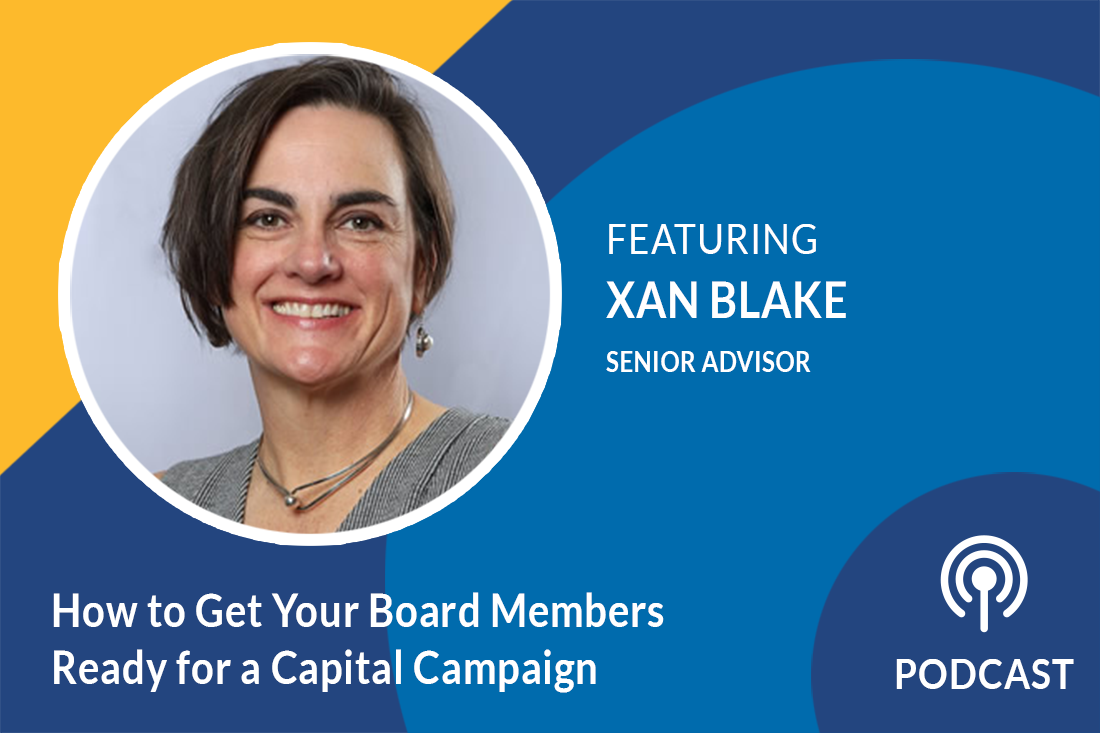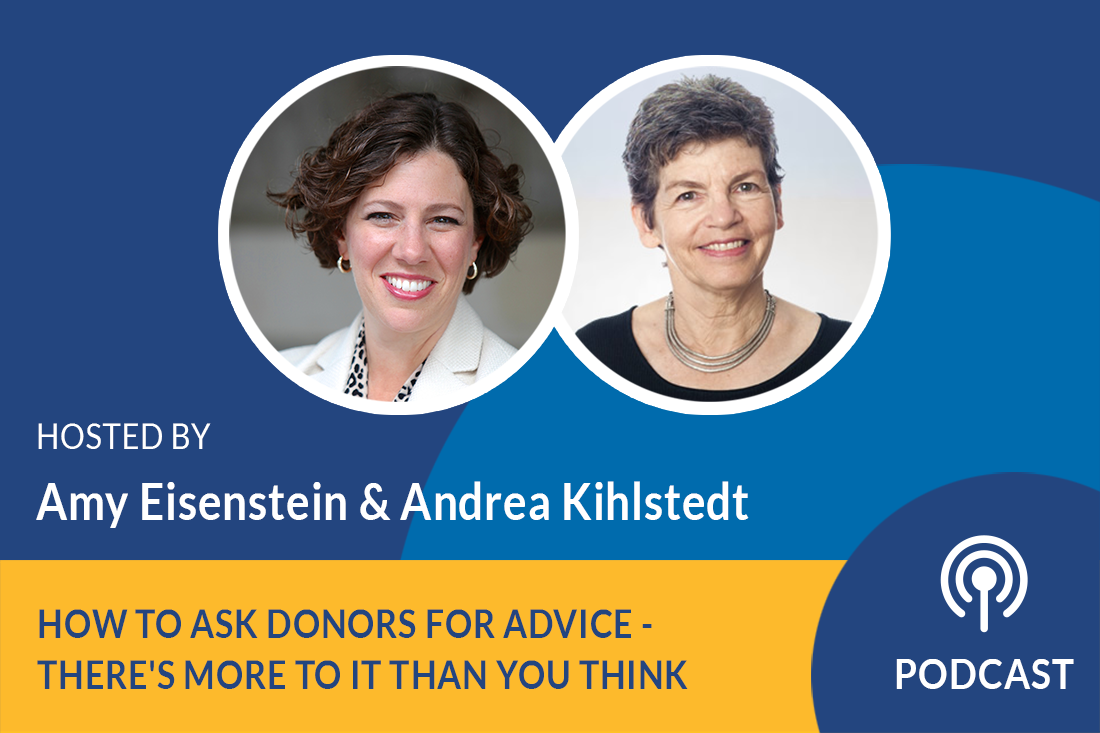Podcast: Prepare for a Campaign by Getting Super-Efficient – 4 Time Management Tips

Season 2, Episode 75
Campaign experts Amy Eisenstein and Andrea Kihlstedt discuss four important ways to become more efficient as you get ready for a campaign. And, they talk about why being more efficient matters and they’ll tell you how to get your board to approve investing in better systems.
Listen Now:
Amy Eisenstein:
Do you ever wonder how you’re going to have time to do a capital campaign when you already don’t have a moment to spare? Today we’re going to tell you four tips to save time and be more efficient and effective.
Hi, I’m Amy Eisenstein, and I’m here with my colleague Andrea Kihlstedt and today we are talking about time management during a capital campaign. That’s because capital campaigns are enormous fundraising endeavors that are plunked on the shoulders of an already stressed executive director, CEO, development director and board. Most of the nonprofit leaders don’t have a moment to spare anyways, so how are they going to take on this additional project, which is in and of itself another full-time job?
A Campaign as an Opportunity to Restructure Your Nonprofit
Let’s talk about some time saving strategies that can really help you during a capital campaign. Andrea, before we get into our four time saving strategies, why don’t you talk about campaigns as an opportunity to think about hiring new staff, restructuring? Because the reality is you can do shortcuts and time saving measures, but a campaign really is another full-time job. So how can organizations think about perhaps using a campaign as an opportunity to build their teams?
Andrea Kihlstedt:
It is a wonderful opportunity for a variety of reasons. First of all, your campaign will have a budget all of its own, and you will be able to invest in your campaign through that budget as opposed to the annual operating budget. You can make the case for hiring someone for the years of a campaign to support you in getting the work done in a way that is likely to get your board’s approval. In the operating budget, they might not be willing to approve an ongoing expense.
Now, hopefully by the end of a campaign, you will have ramped up your annual fundraising so you can continue on with that person. But even if you can’t, you shouldn’t think about doing a campaign all on your own. For the most part, that’s not feasible.
Whether you’re going to hire someone or not, however, you should be as efficient and effective as you can possibly be. One of the reasons for that is that during your campaign, you really should do some self-care things. We encourage you to find enough time to make enough time so that you do things for yourself that are going to keep you from having a nervous breakdown, which is entirely possible through campaign periods.
So get really lean, mean, and effective. We’re going to tell you the four core things to do. Then you can both hire someone and you can go to the spa for a day.
Amy Eisenstein:
I love that. I love going to the spa for a day.
Let me just say one last thing about staffing up. I think a lot of times organizations think that they need to hire a major gift officer or a senior development person, but the reality is that they’re not going to get up to speed, they don’t know your donors, they can’t come in and work magic. I’d actually, in many cases, rather see the executive director and the development director take on the bulk of the campaign work and hire support staff.
So administrative assistants, development associates, people who are going to help with data entry and scheduling and thank you note generation on all those very important critical tasks of the campaign and free up some time for the existing leadership of the organization to go out and have lots of FaceTime with donors.
That is critically important to time management. I don’t want anybody to think that we’re off-topic here. A campaign is a unique and special opportunity to grow your team. Campaigns are all about capacity building, and so let’s build the capacity of your team by adding another staff person.
Time-Saving Tip #1: Use Tech to Schedule Meetings
Alright. But we’re going to get to some very specific concrete time saving, time management tips here for your campaign. The first is scheduling meetings. I mean, what a time suck, going back and forth and back and forth with people. “Are you available on Thursday?” “No.” “How about next Tuesday? How about a three?” I mean, it can take five or 10 or 15 emails to do that sometimes.
Andrea Kihlstedt:
I just did that, Amy. It took forever. It just took forever. It’s ridiculous. Then you think you have it all tied down and then someone can’t do it on that particular day. So then you’re back to the beginning again. What a disaster.
Amy Eisenstein:
One-on-one scheduling is bad enough, and then if you’re doing a committee scheduling or something like that. So there are tons of apps and technology to help you with scheduling. One of the apps that we love and use at Capital Campaign Pro is called Calendly. It’s pretty popular one out there. Honestly, I think it’s saved me a hundred hours a year, two hours a week, going back and forth and back and forth because I just have my calendar.
Now, when we apply this to a capital campaign, I don’t necessarily want to send my biggest and most prestigious donor my Calendly link. I’m going to use it selectively with my most prestigious donor. I’ll probably say:
“I’m available anytime on Tuesday or Friday. What’s most convenient for you?”
And give them the widest option of times or ask what’s their availability and I’ll make it work around my schedule.
There are times when it’s appropriate to go back and forth and be a little more personal, but I think for 90% of your scheduling needs for committees and for one-on-one meetings, you can use apps and technology to save tons of time.
Andrea Kihlstedt:
And so you should. In the beginning when Amy and I started talking about switching over to Calendly for Capital Campaign Pro, I was worried about it because I thought, “Oh, everything is going to get less personal.” Well, have I ever come round? It saves everybody time. I use it all the time, and people are happy that scheduling has become easier.
Don’t hesitate to make friends with technology like Calendly.
Time-Saving Tip #2: Keep Good Filing Systems
Amy Eisenstein:
The next thing I want to talk about is a filing system, both electronic and paper. I have to admit, I’m not always the most organized person, and-
Andrea Kihlstedt:
Amy is pretty close to the most organized person, so don’t take her too seriously.
Amy Eisenstein:
Well, when I’ve misplaced a document or a notepad or files or can’t find a file in Dropbox, it’s a waste of time. So the question is how can you use both technology and organizing and filing systems so that you are more organized during a campaign?
Let’s say you’re 10% more organized than you were before the campaign because you’ve implemented a system or hired an organizing person to help you make sure that you’re not losing files, documents, notes? What do you …
Andrea Kihlstedt:
Well, Amy, I love that you brought someone in to work with you on that, and I think it actually really is such a help.
Some years ago, I brought someone in to clean out everything. Now, not my clothing closet and things like that, but clean out my shelves and my files, mainly my files. I had so many paper files that I didn’t need anymore, and I needed someone to help me with that because I couldn’t discipline myself to do it effectively. She came in, it took us three mornings, three full mornings to get it done, but boy, did it make a difference.
So I was really interested to see that you had done something similar and I encourage you, hire an organizer to come in and sit by your side and discipline the process, whether it’s organizing your computer files, your hard files, whether it’s coming up with a system. When that person actually gets you into a place where you have a system, you will feel like a new person.
Amy Eisenstein:
That’s right, and you will not waste time digging through paper or looking for files or searching documents. So really important.
Time-Saving Tip #3: Maintain Clean Data
Alright, number three is data. Going into a campaign, you want to have as clean of a data system as possible, of course, but also an effective efficient database that everybody in your office can use.
If you cannot generate a report of your biggest and best and loyal donors and generate thank you notes quickly and efficiently and effectively, it’s probably time to look at a new database system because in a campaign, there’s just no reason … when we start with a client and they can’t tell us who their most loyal donors are or their biggest donors or who gave the most last year, that’s a waste of time. There’s no reason for that.
So data, data, data. Anything you want to add, or no?
Andrea Kihlstedt:
It’s not only a waste of time, but when you have fears, when you have things that are inaccurate, then it’s worse than a waste of time. I mean, man, having to make it accurate is a tremendous time suck, but when your data is not accurate, when you can’t pull accurate reports, you put yourself on the brink of disaster.
So spend time, again, get someone to help you if you can’t do it yourself. We’re not all good at that stuff. I am not good at that stuff, but I can get someone to come and help me. I can pay someone to come and help me. I can pay someone to help me learn the system. I can pay someone to set up processes that make it simple for me to do what I need to be able to do. Don’t just hide if you’re not good at that. Get someone to help you.
Amy Eisenstein:
If you are raising, whether it’s $1 million or $10 million or $100 million, this is an opportunity to set aside funds as part of your goal to help build the infrastructure of your whole organization. It’s not just about building a building and providing more programs. It’s about getting stronger as an organization. That includes your systems and your infrastructure and your data management. That’s all part of running an efficient and effective organization. You can’t help clients if your backend is a mess. It just won’t work.
Andrea Kihlstedt:
Let me just add this business about feeling better. I mentioned that before. I think it feels so undermining if you can’t have faith in your data, if you put together a donor report and you’re not sure it’s accurate. It just sets you up to be anxious about your donor visit. If you can’t have confidence in it, if you haven’t spent the time and the resources and the effort to make sure that it is right, then you’re constantly worrying or not sleeping well at night or waking up saying:
“Oh, was this accurate or not accurate, and did I tell this donor that they had given something and they hadn’t given something?”
It’s important to be accurate, not just because accuracy matters, but because it will under … if you can’t have faith or confidence in it, it will undermine your own confidence in your job, and that’s not good.
Time-Saving Tip #4: Avoid Travel Whenever Possible
Amy Eisenstein:
Alright. Excellent. The fourth point we wanted to make is about travel. Travel time sucks up so much time, and now we have this amazing technology of video chats and video conferencing and phones and all sorts of magical things that allow us to be in more than … I don’t know, I was going to say more than one place at once. Maybe that’s not the case.
But I can be meeting with you practically face-to-face [in a virtual meeting] where I can hear your inflection, see your gestures, and you can be around the world or across the country.
Andrea Kihlstedt:
I can meet your dog, you can meet my kitties.
Amy Eisenstein:
Yes, yes. You can come into my kitchen, my home office, whatever it is. But the real point is that if you are commuting, let’s say you commute, let’s talk about basic things, an hour each way a day, half an hour each way, whatever, one day a week could you work from home? Would that be more efficient and effective? We’re looking at time saving tips, right?
If you’re in the car for an hour or two a day, whether it’s traveling to meet with committee members or picking up office supplies or getting lunch, what can you pay to have delivered? What meetings could you have at home?
Just really thinking about how you can be a little more effective and efficient each week, whether it saves one hour or three hours, it really does add up and make a difference. Think about all these different components. Time suck for scheduling meetings, looking for lost files, managing messy data, extra travel time. There are hours and hours that we can find in your week every week to save you time for a campaign. Save you state of mind leading up.
Andrea Kihlstedt:
Freeing up state of mind.
Getting Your Board On Board With Time-Savers
Amy Eisenstein:
I think we can’t wrap up this conversation without addressing the elephant in the room, and that is that board members are not going to want to pay for a file organizer or a new database or a data entry person or let you work from home or scheduling apps or all these things.
However, this is a perfect time to use the cliché penny-wise, pound foolish. You need more time. It’s the one resource we can’t get more of. We can’t get back. So if this is going to keep you from, as Andrea said, having a nervous breakdown or burning out and being effective and efficient and having a successful campaign because you have three extra hours a week to meet with donors or call donors because you’re not searching for files or cleaning up data or traveling when you don’t need to be, these are really important things.
So investing a few thousand dollars in the grand scheme of your campaign is a great investment. You’re going to have a great ROI.
Andrea Kihlstedt:
In the context of your capital campaign, you can make a case for putting that in the campaign budget, for putting these capacity building things in your campaign budget, not for pulling it out of your operating budget when it is not already budgeted. You have an opportunity here to go to your board members, to go to your chief financial officer, to go to your board chair and say:
“If I’m going to stay and manage this campaign at the same time I’m doing everything else, we need to do some investing in systems so that the whole department functions better. Here are the four things that I’d like us to invest in, and we can put it in the campaign budget.”
Now, they’re more likely to say yes to that than by cherry-picking little things here and there that feel out of nowhere.
Amy Eisenstein:
Excellent.
So listen, if you want help with your campaign or you’re looking for advice and guidance and support, I hope you’ll visit the Capital Campaign Pro website and sign up to talk to us so that we can talk to you about how we might be able to support you through your campaign.
Thanks for joining us, and we’ll see you next time.



Leave a Comment